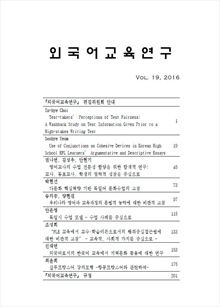간행물
외국어교육연구 Foreign Language Education Research

- 발행기관 서울대학교 외국어교육연구소
- 자료유형 학술지
- 간기 반년간
- ISSN 1229-5892 (Print)
- 수록기간 1998 ~ 2018
- 주제분류 사회과학 > 교육학 사회과학 분류의 다른 간행물
- 십진분류KDC 705DDC 405
권호리스트/논문검색
제2호 (1999년 12월) 9건
1.
1999.12
구독 인증기관 무료, 개인회원 유료
For a new direction of college English programs, this study is designed to analyze Korean university EFL leamer needs. With this goal, this study discusses the results of questionnaires provided for 405 students in the College of Education, Seoul National University. The study also discusses a new direction of desirable English programs on the basis of the needs assessment.
6,700원
2.
1999.12
구독 인증기관 무료, 개인회원 유료
The curriculum development of the Department of German Language Education for the age of information
5,700원
3.
1999.12
구독 인증기관 무료, 개인회원 유료
The purpose of this paper is to suggest a new direction of teaching French culture in Korean high schools. With this goal, this study investigates teaching French culture through teaching French words. Because vocabulary is often a main obstacle to foreign language learners in their communication, vocabulary teaching is one of excellent tools for teaching and learning foreign cultures. The study also proposes the list of cultural aspects necessary to highschool French learners, which are related to 800 words specified by the 7th French Cumculum.
5,100원
4.
1999.12
구독 인증기관 무료, 개인회원 유료
5,700원
5.
1999.12
구독 인증기관 무료, 개인회원 유료
9,300원
6.
1999.12
구독 인증기관 무료, 개인회원 유료
7,800원
7.
1999.12
구독 인증기관 무료, 개인회원 유료
These days there is a movement to adapt English as an official language in Korea as well as in ]apan regardless of the danger that our mother tongue Korean or ] apanese could degenerate into a so-called museum language, i.e., dead language. The assertion that globalisation refers to the age of English forces us to consider why and for what we teach and leam the German language. In the age of globalisation, the horizon of multicultural understanding should be broadened. The English-only politics allows us only one world-view or ideology and we will encounter a really monotonous and devastated culture-landscape. In this context, teaching German can contribute to multicultural understanding.
8,600원
8.
1999.12
구독 인증기관 무료, 개인회원 유료
In an effort to invigorate French education in the 21st century, this study m와‘es a diachronic investigation into French education in Korea. In this study, we will t빼e a look at French education goals and French textbooks, including the changes that have taken place over the years. This study also investigates the problems of current French education and suggests some possible solutions. The problems in French education today include a decrease in the number of French leamers, the disparity between educational goals and reality, and the poor quality of the teachers. In response to these problems, this study proposes the following solutions: 1) smaller classes consisting of fifteen to twenty students, 2) the adoption of French listening-comprehension test in the college entrance ex없n, 3) the setting of realistic educational goals, and 4) the development of functional French - i.e. French for special purposes - based on leamer’ s need.
4,300원
9.
1999.12
구독 인증기관 무료, 개인회원 유료
This study is designed to suggest a new direction of Chinese language education in Korea. With this go머, this study analyzes the results of questionnaires provided for high school teachers and college professors of Chinese. Results show that it is much needed to develop teaching methods of pronunciation, practical teaching materials, multimedia, small group activities, and team teaching with native speakers. The study also provides some implications for Chinese language education.
6,100원

